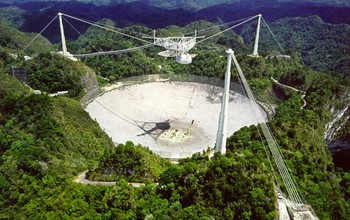Press Statement 18-002
Statement on Award of Cooperative Agreement for Management and Operations of Arecibo Observatory
Award initiates formal transition activities for the observatory
February 22, 2018
This material is available primarily for archival purposes. Telephone numbers or other contact information may be out of date; please see current contact information at media contacts.
Richard Green, director of the National Science Foundation (NSF) Division of Astronomical Sciences, and Paul Shepson, director of the NSF Division of Atmospheric and Geospace Sciences, issued the following statement.
The National Science Foundation (NSF) is pleased to announce that beginning Feb. 22, the University of Central Florida (UCF) will start formal transition activities to take on the operations and management of NSF's Arecibo Observatory in Puerto Rico. NSF is currently negotiating the operations and management award with UCF.
With this award, UCF will fulfill NSF's preferred alternative for management and operations of the observatory. The university will take over formal management and execute a program of research and education consistent with the objectives and priorities of the scientific community. The university will provide support and technical personnel to manage the observatory, its research and educational activities.
The award duration is expected to run five years, with NSF contributions decreasing over time from the current level of approximately $8 million per year to approximately $2 million per year by the second half of Fiscal Year (FY) 2022.
This award ensures continued science-focused operations that maintain ionospheric, planetary and astronomical research, including radio observations of astronomical sources, planetary radar observations of solar system and near-Earth objects, and studies of Earth's atmosphere.
-NSF-
Media Contacts
Joshua Chamot, NSF, email: jchamot@nsf.gov
The U.S. National Science Foundation propels the nation forward by advancing fundamental research in all fields of science and engineering. NSF supports research and people by providing facilities, instruments and funding to support their ingenuity and sustain the U.S. as a global leader in research and innovation. With a fiscal year 2023 budget of $9.5 billion, NSF funds reach all 50 states through grants to nearly 2,000 colleges, universities and institutions. Each year, NSF receives more than 40,000 competitive proposals and makes about 11,000 new awards. Those awards include support for cooperative research with industry, Arctic and Antarctic research and operations, and U.S. participation in international scientific efforts.
Connect with us online
NSF website: nsf.gov
NSF News: nsf.gov/news
For News Media: nsf.gov/news/newsroom
Statistics: nsf.gov/statistics/
Awards database: nsf.gov/awardsearch/
Follow us on social
Twitter: twitter.com/NSF
Facebook: facebook.com/US.NSF
Instagram: instagram.com/nsfgov

